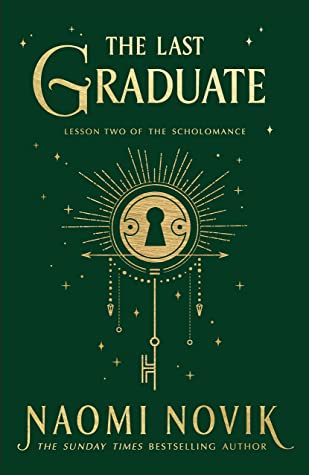SNQ: Naomi Novik’s “The Last Graduate”
by Miles Raymer

Summary:
Naomi Novik’s The Last Graduate is the second book in her Scholomance trilogy. Now in their senior year at the Scholomance, Galadriel and her classmates are generating every bit of mana they can muster and practicing to take on the horde of maleficaria that awaits them on graduation day. As the end of their final term approaches, an unexpected discovery complicates their plan and forces them to become more adaptable and cooperative than ever before. The Last Graduate is as close to perfect as a sequel can get, avoiding all the classic “middle book” pitfalls that weaken many trilogies. Novik keeps readers hanging on every word and leaves them begging for more.
Key Concepts and Notes:
- The Last Graduate expertly achieves the dual mission of every great sequel: (1) continue everything that was good about the original story, and (2) introduce new details and dynamics that widen the narrative’s scope without breaking continuity with what came before. Anyone interested in the highlights of the first book can check out my review of A Deadly Education. The remainder of this review will focus on the new elements introduced in The Last Graduate.
- Novik takes the ethical concerns of A Deadly Education and builds on them, challenging Galadriel to reckon with the scope of responsibility that comes along with her unique and powerful magical talents. Her expanding circle of ethical concern––captured most intimately by her growing network of friendships––is the primary driver of Galadriel’s intellectual, moral, and social development in this novel. One might argue that Galadriel’s most valuable gifts are her ability to rapidly integrate new perspectives, to change her mind when new circumstances arise, and to consider ever-larger and more complex coordination problems.
- The Last Graduate reveals new insights about the character and function of the Scholomance as a magic entity, including its motivations and specific attitude toward Galadriel. Novik does an excellent job of personifying the school, injecting the ideal dose of ambiguity into its behavior to keep the reader guessing what it will do next.
- Novik also introduces a new political angle that I hope will play a larger role in the third book. It concerns tensions between the western magical community (primarily the UK and USA) and wizards from the east (primarily China). This conflict provides clever commentary on real-world geopolitical issues, again widening the ethical concerns and aspirations of the series.
- I wouldn’t say that the central romance of the Scholomance series is its strongest feature, but that didn’t stop me from shedding a few tears and desperately grabbing for my copy of The Golden Enclaves as soon as I finished this novel. The Last Graduate simply sticks the landing in every respect.
Favorite Quotes:
They both kept a space open until I lurched in to join the hug, our arms around each other, and it was the miracle all over again, the miracle I still couldn’t quite believe in: I wasn’t alone anymore. They were saving me, and I was going to save them. It felt more like magic than magic. As though it could make everything all right. As if the whole world had become a different place. (38)
It’s a bullet-point line in the graduation handbook: As a general rule, regardless of the specific situation in which you find yourself, at every step you must take care to preserve or widen the number of your options. It hadn’t quite sunk in properly, but now it did. Having a choice meant being able to choose something that worked for you and whatever you were carrying and whatever you’d prepared. Having a choice meant you got to choose getting out. (198)
I could turn around at the gates and wave everyone on my team through and wreak destruction on every mal that came in range, until all of my friends were safe. So I had to. Of course I had to. I couldn’t go running through the gates to safety, to the green woods of Wales and Mum hugging me tight, while anyone I loved was still behind me. I had to turn back and keep the gates clear for them until they all made it through. They hadn’t asked me, they wouldn’t ask me, because that went against the rules we all understood, but I’d do it anyway, because I could. (206-7)
He wasn’t locked in a grim, desperate struggle for his life, counting every drop of mana like a tumbling grain of sand in an hourglass. His every movement, each graceful killing sweep of his sword-whip, every spell he cast, every effort he put forth, they all fed him back, and you couldn’t help but feel, watching it, that he was doing what he was meant for––something so perfectly aligned with his nature that it was as easy as breathing. It made sense suddenly that you’d like it, that it would be everything you wanted to do, if there were something you were this good at…Your own body would teach you to want it more than anything––want it so much you’d have to learn to want anything else. (374-5)